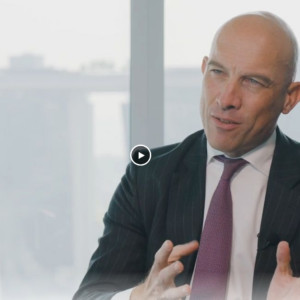
Mayur Nallamala, head of Asian equity at RBC BlueBay Asset Management, believes there are still opportunities available in Chinese stocks, while the recent rally should benefit the wider region
China has seen a sharp rally since the U-turn over zero-Covid. Is there still value to be found for equity investors?
Yes, I think risk reward for China equity is still attractive, both for the long run and the short run. To your point though, when compared to three months ago, there is definitely a greater need now to be more selective, carefully understanding what is happening on the ground in terms of fundamentals.
To recap, there was a lot of pessimism and de-risking building up in the market on China equity right up to the 20th Party Congress in late October, and shortly after that point as strict Covid policies hampered economic activity. At this point, valuation for China equity was at or below global financial crisis levels. The share price divergence or valuation discount even with emerging markets was at historical levels. After China made a massive U-turn by dismantling its Covid policy most investors were caught by surprise because it was so rapid and broad.
Since then, the MSCI China index is up 50 per cent or so. For short-term investors, especially if you’re asking if it’s a good time to just buy China equities at the index level trying to time the market, it is understandable that you’re asking if it’s too late or if there is still value to be found. But we need to remember that this is the second largest economy in the world that is showing broadening all the time in terms of development and depth in terms of stockmarket access. The greatest appeal to investing in China equity is that it has a lot of idiosyncratic alpha opportunities that remain available.
Is there pent-up demand in China given the lockdowns? How can investors take advantage of this?
Yes, I agree there is pent-up demand. China probably had one of the strictest lockdowns over the past three years. Even in the recent Chinese New Year holidays, many people in mainland China were able to really have big family gatherings and enjoy the festive season for the first time in three years. They want to dine out, meet people, travel, and as activity levels pick up, so should consumption. There is a lot of focus now on the pace of this re-opening and activity pick up and that will probably be key for at least the next few quarters.
On the other hand, spending power is another reason that consumption may pick up in the short term. Government statistics show that during the last three years of lockdown, the average Chinese household has accumulated quite a bit in excess savings. Some economists estimate this excess saving can be as much as 5-10 per cent of GDP.
So this lack of consumption was a big part of the economic slowdown in the recent few years, and with the re-opening, consumption should pick up meaningfully, notwithstanding the possible damage that certain recent (Covid and internet regulation) policies have done to employment and confidence in recent years. The government has stated that “forcefully reviving market confidence” will be a policy priority for 2023. They’ve also indicated support for spending in select industries.
How should investors take advantage of this? Unsurprisingly perhaps, the so-called re-opening and pent-up consumption names were the first to rally last year and as a result many of these names are no longer at bargain valuations. Perhaps we went from everything being cheap in October of last year, to everything related to re-opening rallying in the last three months, somewhat indiscriminately. That’s why throughout this year, we’ll be on-the-ground monitoring how fast economic activity actually picks up and where that excess saving is spent. Some names that rallied in the past three months will disappoint on fundamentals while others will exceed expectations.
We heard a great deal about a government crackdown on internet companies. How does that sector look now?
Over the last couple of years, the government crackdown on internet companies was a major reason for growing scepticism in the market on China equity, in addition to the regulatory crackdown on other private sector businesses like after-school tutoring. We all remember back in late 2020 when Alibaba’s financial arm, Ant Group was blocked from a major IPO that was expected to be $300bn. Just last month, Ant Group was finally allowed to increase its capital.
These regulatory concerns appear to be ameliorating now and the delta certainly is more positive. Already in 2022, there were a series of events that suggested things were easing for China internet. The government stance since the October Party Congress has also been very clear that in the short run they need to get the economy back on track after three years of lockdown, plus in the long run, they have ambitions to double the GDP per capita from 2020 levels. Reflecting on this, I doubt if the intent was ever to be full-on anti-market; it was rather to set clear and firm regulatory guardrails according to values they see fit, while driving economic growth together with the private sector.
What does the improving situation in China mean for other Asian countries?
The improving situation in China is likely to be a growth driver for Asian countries that have strong economic ties with China. Countries like Japan, Korea and Thailand are popular holiday destinations from Chinese tourists. Korea, Japan and Australia also have a lot of exports into China. While the global economy may be seeing slower growth this year, the Chinese economy starting the engine again should help to offset that to some extent.
That said, there is growing concern on how lumpy this might be and whether that can create inflation pressure globally, even in a sporadic way. A lot of demand is coming back but a lot of supply also has to be restored back to pre-pandemic levels for that demand to get digested. This is something to be watched over the course of 2023.
We have seen a diversification of supply chains away from China. Has this provided an opportunity for other countries in the region?
Yes, even without Covid, we’re not going back to how things used to be. The trade war between the US and China was set in motion in early 2018 and we have been of the view that this is one of the few areas of bipartisan agreement that exist in the US – many tariffs have been maintained under the Biden administration. Even aside from the political aspect and intellectual property concerns, the pandemic showed us how excessively concentrated supply chains can be vulnerable.
Apple is probably a good example. Prior to Covid, one major manufacturing plant in Zhengzhou was producing 85 per cent of iPhone Pros. Late last year, right before peak holiday shopping, Apple had to release a statement saying customers will have to wait longer for the new 14 Pro models because the city of Zhengzhou is not at full utilisation rates due to Covid curbs. Reportedly, they are seeking to accelerate plans to move production out of China and into countries like India and Vietnam.
There’s still a lot of uncertainty still on global trade, supply chains, and deglobalisation. But I think the last few years were a major wake-up call for companies and industries that had a particularly skewed supply chain. This is starting to move to other Asian countries, something we’ll see pan out for the next five years or more probably. Slow, but the direction seems clear. On one hand, these things take years and the industry is guessing even Apple will need more than three to four years. On the other hand, if big names like Apple move to India, that can really be a catalyst for other companies to follow.
Is sustainability a growth driver in Asia as it is in Europe?
Definitely not as it is in Europe, but we are seeing notable improvements in this area. As a team, we have observed the overall environmental, social and governance (ESG) awareness and related corporate disclosures making major leaps during the past few decades in Asia. Most of the major economies in Asia like China, Japan, India, Korea and Australia have all pledged to be carbon neutral and it’s a lot easier for us to engage with our investee companies now on how they see their carbon footprint and energy transition risk to their business. The same goes for other ESG issues related to social or governance.
Whether sustainability is a growth driver though, I think is a slightly different question. China has a major renewable energy industry and its electric vehicles industry is also world class. They have been investing in R&D and production capacity across the supply chain aggressively both for domestic demand and to grow this as a competitive edge globally. These businesses are actually seeing sustainability as a growth driver and building their business model accordingly.
As long-term investors, it is as important in Asia as in Europe, to think about sustainability and ESG in all our investments. Doing first hand due diligence with some industry specific understanding on ESG materiality for each business really makes a difference. We pay extra attention to companies that show potential risk in this regard, be it on how they run the business or on how they report their financials.
Mayur Nallamala is head of Asian equity and portfolio manager of the Asia ex-Japan Equity strategy at RBC BlueBay Asset Management





